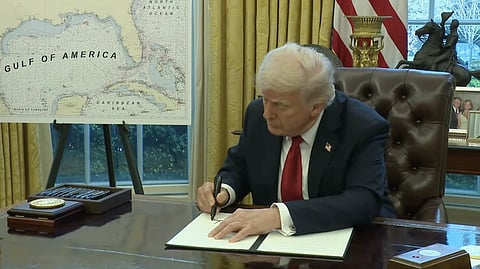

Donald Trump has signed an executive order implementing a 25% tariff on foreign-made cars and light trucks.
That amount is in addition to tariffs the president has already implemented.
During a signing ceremony on Wednesday, Trump suggested the move would bring automotive manufacturing back to the United States. When asked if there was anything foreign nations could do to have the auto tariffs removed, he said they were "permanent."
The president dismissed suggestions that Elon Musk urged him to make the move, adding, "I've never had Elon come and say, would you do me a favour?"
News of the auto tariffs was met with concern from Ontario Premier Doug Ford.
"President Trump is at it again," he wrote in a post on X. "His 25 per cent tariffs on cars and light trucks will do nothing more than increase costs for hard-working American families. US markets are already on the decline as the president causes more chaos and uncertainty. He's putting American jobs at risk."
Ford said he'd spoken with Prime Minister Carney, and that they both "agree Canada needs to stand firm, strong and united."
"I fully support the federal government preparing retaliatory tariffs to show that we’ll never back down," he added.
Ford's sentiments were echoed by the Canadian Chamber of Commerce.
"The consequences of today's escalation in this destructive tariff war will not be contained to Canada, as much as the US administration would like to pretend," President and CEO Candace Laing said. "Throwing away tens of thousands of jobs on both sides of the border will mean giving up North America's auto leadership role, instead encouraging companies to build and hire anywhere else but here."
She warned that the tariff "puts plants and workers at risk for generations, if not forever," pointing out that "the North American automotive supply chain has been secure, integrated, and resulted in better cars for consumers since 1965."
"Automotive parts can cross international borders up to eight times before final assembly," Laing continued. "With this latest tariff, the US administration has committed to taxing America's automotive manufacturers and increasing the production cost of a car."
As of now, roughly 22% of North American vehicles are produced jointly in Michigan and Ontario. Laing said such integrated supply chains "make sense economically, which makes sense financially for the American and Canadian families and drivers looking for a reliable, affordable, and made-in-North America vehicle."
"We’re severely disappointed in the US administration's dogged pursuit of trade policies that harm Americans and Canadians," she continued, noting that tariffs could cause the price of a pickup truck to rise by as much as $8,000 USD. "With a third of Canadian jobs impacted by the auto sector, every tariff or even threat of a tariff should propel our public and private sectors to work together for the good of all Canadians — and that means taking care of our economy."
"I want to start by condemning, without equivocation, the unjustified and unprovoked tariffs that President Trump has now announced against our auto sector," Conservative leader Pierre Poilievre said. "These tariffs will damage his workers and his economy, just as they will damage ours. We must retaliate and target goods and services that we don't need, can buy elsewhere, or make ourselves to maximize the impact on the Americans while minimizing the impact on ourselves."
He offered his support for workers in the auto sector, promising to "ensure that you have income replacement to put food on the table and money in your bank account."
"We'll make sure that businesses directly affected will have the liquidity they need to get through this dispute. And we will unite as Canadians to protect our affected sectors. But more than that, we need to become strong, self-reliant, and sovereign, so that we can stand on our own two feet and stand up to the Americans."
Carney called Trump's move a "direct attack" on Canada.
